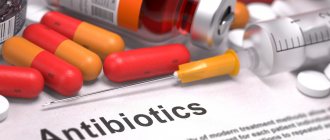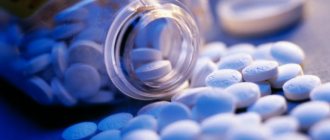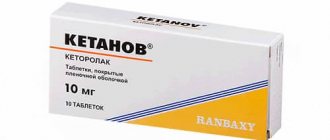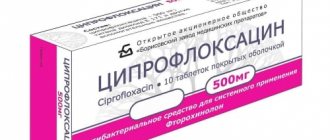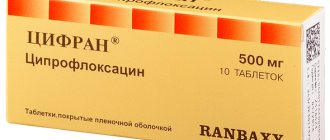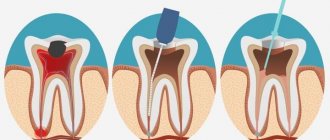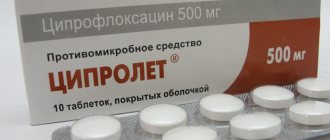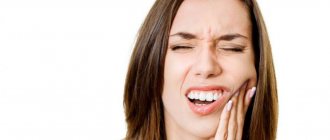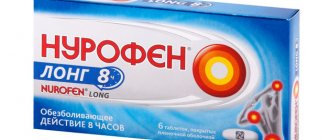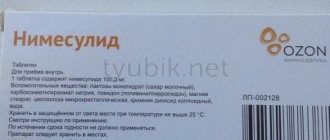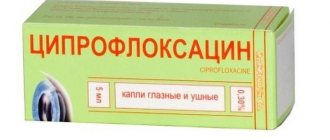Compound
One tablet contains 250, 500 or 1000 mg of the active ingredient ciprofloxacin . Additional substances : talc, hydroxypropyl methylcellulose, sodium alginate, magnesium stearate, crospovidone, anhydrous colloidal silica gel, sodium bicarbonate.
Tsifran ST additionally contains 600 mg of tinidazole .
100 ml of solution contains 200 mg of ciprofloxacin lactate.
pharmachologic effect
Tsifran, is it an antibiotic or not?
Yes, the principle of antimicrobial action is based on preventing the proliferation of bacteria, which leads to the death of the microorganism. The drug affects gram-positive bacteria and gram-negative flora that are resistant to aminoglycosides , penicillins and cephalosporins . The antimicrobial effect is observed in all organs and systems, suppressing the infectious process and inflammation, which makes it possible to use an antibiotic for toothache.
The active ingredient in the drug Tsiprolet is ciprofloxacin , so in fact Tsiprolet and Tsifran have the same pharmacological action.
Cifran OD is an extended-release, long-acting ciprofloxacin.
The origin of pain in the tooth under the crown
It can vary in character:
- not strong;
- high;
- acute;
- sharp;
- moderate;
- aching.
The intensity of the pain may vary when opening and closing the mouth, while brushing and rinsing, as well as when eating food and liquids: ice-cold, hot, sweet and sour drinks and dishes.
The intensity of pain may vary depending on the use of cold or hot
The use of antibiotics is possible for diseases such as:
- pulpitis, which has nerve endings, blood vessels and lymph nodes. During illness, all this becomes inflamed and, as a result, brings discomfort;
Pulpitis
- periodontitis - the ligamentous apparatus is damaged and the gums become inflamed;
Periodontitis
- gingivitis - inflammation and redness of the gums;
Gingivitis
- A fistula is a small space in the gum that occurs due to an inflammatory process in one of the roots of the tooth. It looks like a blister, is dark red in color and has a light head;
Fistula
- Periodontitis is an inflammation of the periodontium, in which the integrity of the ligaments is disrupted. They hold the tooth in the alveolus, the cortical plate of the bone;
Periodontitis
- Tooth granuloma is a protective reaction of the body to purulent flows. The result is a small formation near the root of the tooth.
Tooth granuloma
Drawing a small conclusion, it can be noted that antibiotics for dental discomfort are prescribed only if infection has occurred and there are inflammatory processes.
This does not apply to external causes of pain, including:
- injury or blow (if the integrity of the teeth is not compromised and infection has not occurred, then antibacterial therapy is not prescribed);
- growth of new teeth (often in young children, rarely in adults);
- recent appointment with the dentist (incorrect treatment).
If pain occurs due to external factors, antibiotics are not prescribed
Pharmacodynamics and pharmacokinetics
In relation to gram-negative flora, a bactericidal (destructive) effect is manifested in the phase of division and rest (the active substance acts on the enzyme DNA gyrase and causes death, lysis). Tsifran 500 acts on gram-positive flora only during division. Macroorganisms lack the enzyme DNA gyrase , which makes ciprofloxacin low toxic to humans. Parallel development of resistance to other antimicrobial drugs ( tetracyclines , aminoglycosides ) during treatment is not observed. Resilience develops very slowly.
Drugs that relieve toothache and gum inflammation
Doctors recommend using the following medications:
- Tetracycline. The tablets are dissolved in water, after which the mouth is rinsed.
- Ecositrin. Mainly exhibits bacteriostatic properties, but can have a bactericidal effect. Suppresses the DNA synthesis of microbes, which disrupts their growth and reproduction. Does not affect the vital activity of “beneficial” intestinal microorganisms. Available in the form of tablets for oral administration.
- Flemoclav. This is a synthetic penicillin that has a bactericidal effect. The composition also contains clavulanic acid, a beta-lactamase inhibitor. This allows the pathogenic microbe to remain sensitive to the antibiotic.
- Clindamycin. It has a bacteriostatic and bactericidal effect on pathogenic microorganisms. Active against gram-positive and gram-negative bacteria. Available in the form of tablets and ampoules.
Reference! Modern doctors prefer to prescribe the tablet form of drugs. It is believed that injections into the gums are more harmful than effective.
Contraindications
- intolerance to the active component ciprofloxacin;
- carrying a pregnancy ;
- lactation.
For mental illnesses, severe atherosclerotic changes in the brain, epileptic syndrome, pathology of the renal system, the drug is prescribed with caution, weighing possible complications and the expected result. Not recommended for use by elderly people.
Analogues of the drug that eliminate toothache
In addition to Cifran, dentists prescribe a large number of other antimicrobial agents. Their mechanism of action is similar, but there are marked differences in composition, contraindications and undesirable effects. You can decide which medicine to choose by visiting a doctor and reading reviews, of which there are a large number on the Internet. Common antibiotic tablets:
- "Tsiprolet". The positive aspects are immediate absorption into the blood and, as a result, very fast action. It helps with toothache and eliminates inflammation. Duration of action is about 4 hours.
A special feature of the drug is that it is excreted from the body through the kidneys. Therefore, persons suffering from diseases of these organs should be careful when taking this drug. Usually this is a doubly reduced dose, but you should consult a specialist.
- "Ciprofloxacin." In a short time it destroys pathogenic microflora, eliminating pain. Very popular for toothache. You should drink plenty of water while taking this antibiotic.
- "Amoxiclav". It does not have such a wide spectrum of action as Tsifran. It will effectively eliminate inflammation of the gums, pain in and around the tooth.
Side effects (adverse reactions)
The cardiovascular system:
- drop in blood pressure levels;
- cardiopalmus;
- arrhythmias.
Digestive tract:
- cholestatic jaundice (more often in susceptible individuals);
- loss of appetite;
- diarrhea syndrome;
- nausea;
- epigastric pain;
- hepatitishepatonecrosis.
Nervous system:
- anxiety;
- headache;
- fast fatiguability;
- sleep disorders;
- peripheral paralgesia (impaired perception of pain);
- hyperhidrosis;
- various psychotic reactions.
Sense organs:
- impairment of auditory perception;
- noise in ears;
- impaired color perception, diplopia ;
- perversion of taste.
Genitourinary tract:
- crystalluria;
- hematuria;
- dysuria;
- glomerulonephritis;
- interstitial nephritis.
An allergic response in the form of urticaria, drug fever, and epidermal necrolysis . Myalgia , arthralgia, tendon ruptures, and blood changes are rarely recorded
Rules for the use of antibiotics
Caution when taking dental antibiotics is an immutable rule. When prescribing a medicine, the doctor takes into account several factors: spectrum of action, ease of administration, degree of toxicity, presence of side effects and their number, contraindications. If you are prescribed such a remedy, follow these recommendations:
- study the list of side effects and monitor your condition;
- strictly follow the dosage prescribed by your doctor;
- Take it according to the instructions for the drug;
- take the tablets only with drinking water;
- find out which medications the prescribed drug can be used with;
- Avoid alcohol while taking an antibacterial agent;
- do not interrupt the course of treatment;
- Please note that their effect of the drug begins after 24-48 hours.
It is all the more important to follow the rules of administration because antibacterial drugs have a strong effect on the body. An overdose leads to serious complications; the wrong course of administration does not give the desired effect and negatively affects other organs. If the dentist has told you how to take the medicine and pointed out special nuances, you must strictly follow his recommendations. It is obvious that self-medication of the mouth with such drugs carries an increased danger for the patient.
For the treatment of flux
Flux not only hurts, it also causes physical discomfort. The easiest way to deal with flux is with antibiotics. However, you should not resort to them yourself; let your dentist prescribe the appropriate remedy for you. Typically, the doctor prescribes medications such as:
It should be borne in mind that they all have special properties, so you cannot take them on your own. Lincomycin works effectively, but it has many contraindications, but Ampiox has practically none. Tsifran st is prohibited for use by children under 16 years of age. The maximum course of treatment is 7 days, the dosage is determined individually.
Read also: Ketanov for toothache, method of application
To relieve inflammation from gums
For gingivitis and periodontitis, similar products are also used. As a rule, the dentist prescribes Metronizadol in combination with stronger antibiotics. For example, Lincomycin, which is taken in tablet form or given by injection. The drug should not be given to children under 6 years of age.
Clindamycin is also used, a drug with fewer side effects. For swollen gums, it is advisable to take the medicine in tablet form. Injection into the gums is dangerous due to the high concentration of the drug, it begins to quickly kill microorganisms, they accumulate, and toxins are released, causing negative processes in the area of attachment of the tooth to the bone.
After tooth extraction
After removing a patient's tooth, the doctor may prescribe antibiotics. Drugs are prescribed that have analgesic and strong anti-inflammatory properties:
- Amoxicillin,
- Azithromycin,
- Levomycetin,
- Ibuklin,
- Metronidazole.
After tooth extraction, it is important for the doctor to prevent the spread of possible infection to the periosteum and other tissues, and to relieve the patient’s pain. The course of administration is limited so that an overdose does not occur and complications do not arise after removal from the antibacterial agents themselves.
Inflammation of tooth roots
When there is inflammation in the root of the tooth, depulpation is added to antibiotic treatment. Infection during caries or penetrating under the crown requires immediate relief to avoid its spread to the entire bone tissue. Taking antibiotics to prevent the growth of the process also becomes a mandatory measure. For drug treatment of pulpitis, the dentist selects osteotropic and penicillin medications, having studied the nature of the infection.
As a rule, drugs such as Ciprolet, Biomycin, Amoxiclav, Ciprofloxacin, Doxycycline, Augmentin are prescribed. Their task is to eliminate the inflammatory process and reduce pain.
For the treatment of other dental infections
For maxillofacial injuries and pericoronitis, antibiotics are taken under the supervision of a specialist.
To alleviate the condition and prevent further infection of the body, penicillin medications are used. Painkillers are also prescribed. The dentist, focusing on the patient’s condition, can prescribe Lincomycin, Doxycycline, Ampicillin, Tsifran st, Tsiprolet. An advanced form of caries, chronic sinusitis, pulp burn, infection through the bloodstream in the presence of another disease - all these are indications for a course of medication.
- For diabetic patients, it is better to take special medications with minimal side effects (Nomitsin, Tarivid, Sifox).
- For odontogenic infections, dentists prescribe Gentamicin.
Instructions for use of Tsifran (Method and dosage)
How to take the drug: To increase bioavailability, it is strongly recommended to take the tablets on an empty stomach. Increased water intake is required throughout the entire treatment period. Infusion of the solution is possible only intravenously for 0.5-1 hour.
Treatment of uncomplicated pathology of the genitourinary tract: every 12 hours, 250 mg.
Treatment of prostatitis, severe pathology of the urinary system: 500 mg twice a day.
Treatment of ENT pathology, respiratory system diseases, typhoid fever: 500 mg every 12 hours. In severe cases, the medicine is recommended to be administered parenterally according to the following scheme: 200 mg (100 ml bottle) slowly intravenously twice a day (it is possible to increase the single dose to 400 mg).
Instructions for Cifran ST: tablets must be taken after meals, without destroying the integrity of the protective shell. The recommended dosage is 250\300 mg (the ratio of the active substances ciprofloxacin and tinidazole) twice a day, 2 tablets.
Instructions for use of Tsifran OD: taking the medication on an empty stomach accelerates the antibacterial effect. Recommended treatment regimen: 250 mg 2-3 times a day.
Rules for taking antibiotics
For tooth pain caused by inflammation, a course of antibiotics is prescribed. The duration of treatment can be from 5 to 14 days . The doctor will tell you what antibiotics to take for tooth inflammation and in what mode. Before the appointment, you need to warn the dentist:
- about cases of severe allergic reactions to any medications;
- about chronic diseases;
- about medications taken on a regular basis (to determine compatibility).
Since the effect of any, even the most effective antibiotic for tooth pulpitis and other inflammatory diseases will begin only after 24–48 hours, it is better to warn the doctor about the presence of pain. If your jaw hurts, disrupting the normal rhythm of life, taking painkillers is indicated. They can be drunk for 5 days until the infectious process is suppressed.
Read also: Candida for the oral cavity
Important! After the clear symptoms (pain, swollen gums and soft tissues) disappear, some patients stop taking the prescribed medications. This should not be done - the course must be completed to the end, otherwise the sore spot will continue to inflame with renewed vigor.
Another category of self-medicators begins to take the drug in an increased dose from the first days of treatment. This is also unacceptable. Bactericidal agents have strong side effects and have a toxic effect on the body, so you can take exactly as many tablets as the doctor prescribed.
Why and how to use probiotics
Given the tendency of the active substances of antibiotics to disrupt the microflora, many dental clinics simultaneously prescribe probiotics that restore it.
The names of these drugs are known to everyone: The first dose of the probiotic can be taken even before the start of treatment, and after completing the main bactericidal course, you need to drink the medicine for another two weeks.
Compatibility of antibiotics with alcohol
Alcohol of any kind is absolutely incompatible with antibiotics, so it should be excluded for the entire period of their use. Hepatologists advise waiting to drink alcoholic beverages and medications for at least 2 weeks after finishing antibacterial treatment.
Interaction
Theophylline levels increase with concomitant treatment with ciprofloxacin . It is recommended to maintain a 4-hour window between doses of Cifran and drugs containing zinc, iron, magnesium, sucralfate , aluminum. Anti-inflammatory, non-steroidal drugs enhance the stimulating effect of the drug on the nervous system . Mandatory monitoring of the coagulogram when taking Warfarin .
Analogues of Tsifran ST
Level 4 ATX code matches:
Siflox
Hyleflox
Leflobakt
Lefoccin
Gatifloxacin
Ofloxacin
Faktiv
Tigeron
Lebel
Zanotsin
Lomefloxacin
Eleflox
Lomflox
Pefloxacin
Tsiprobay
Sparflo
Tariwid
Zoflox
Abaktal
Moxifloxacin
There are no substitutes for the combined drug Cifran ST. Analogues of the drug Tsifran: Tsiprinol , Tsiprobay , Tsiprolet .
Price for Tsifran, where to buy
The cost of the medicine is determined by the region of sale and the dose of the active substance. The price of Cifran OD 1000 mg tablets in Moscow is 300 rubles. The price for Cifran ST 500 mg is 350 rubles. The minimum price for an antibiotic is 180 rubles. You can find out how much the drug costs and buy it at any pharmacy in your region.
- Online pharmacies in RussiaRussia
- Online pharmacies in UkraineUkraine
- Online pharmacies in KazakhstanKazakhstan
ZdravCity
- Cifran ST tablets p.p.o.
500/600 mg 10 pcs. Ranbaxy Laboratories Limited RUB 301 order
Pharmacy Dialogue
- Tsifran OD (tab. 1000 mg No. 10)Ranbaxy
RUB 311 order
- Tsifran OD (tab. 1000 mg No. 10)Sun Pharmaceutical Industries
RUR 318 order
- Tsifran ST (tablet p/o 500mg+600mg No. 10)Ranbaxy
RUB 338 order
- Tsifran (tab. 250 mg No. 10)Ranbaxy
44 RUR order
- Tsifran OD (500 mg tablet No. 10)Ranbaxy
170 rub. order
show more
Pharmacy24
- Cifran OD 1000 mg No. 5 tablets Sun Pharmaceutical Industries Ltd., India
108 UAH.order - Cifran OD 500 mg No. 10 tablets Sun Pharmaceutical Industries Ltd., India
83 UAH order
- Cifran OD 500 mg N5 tablets Sun Pharmaceutical Industries Ltd., India
58 UAH order
PaniPharmacy
- Cifran tablets 500 mg No. 10 Ukraine, Ranbaxy
88 UAH order
- Tsifran OD tablets Tsifran OD tablets 500 mg No. 5 India, SUN
66 UAH order
- Tsifran OD tablets Tsifran OD tablets 1000 mg No. 5 India, SUN
120 UAH order
show more
